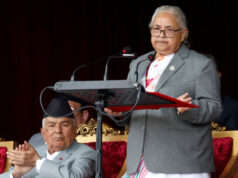Two judges of Pakistan’s Supreme Court have resigned in protest against Army Chief Gen Asim Munir’s promotion as Chief of Defence Forces (CDF) through the 27th Amendment. Describing it as a “grave assault” on the constitution, Justices Mansoor Ali Shah and Athar Minallah wrote separate letters to the chief justice.
“I need not reproduce the detailed contents of that letter, but suffice it to say that, against a canvas of selective silence and inaction, those fears have now come to be,” Minallah wrote. “The Constitution that I swore an oath to uphold and defend is no more,” he added.
“Continuing in such a version of the Supreme Court of Pakistan would only suggest that I bartered my oath for titles, salaries, or privileges,” read Justice Mansoor’s resignation letter, The Tribune daily reported.
Munir’s new status clearly asserts the army’s dominance over the air force and the navy. It also clips the judiciary’s powers since it gives Munir lifelong immunity from criminal proceedings.
But the amendment sailed through parliament with a two-thirds majority. Only four MPs voted against it. MPs from the Opposition Pakistan Tehreek-e-Insaf (PTI) of jailed former premier Imran Khan walked out before the vote in parliament and tore up copies of the bill in protest, saying they had not been consulted.
“None of the parliamentarians cared about democracy, and the judiciary was being eliminated. They have voted for being a silent observer whilst the country becomes a banana republic,” PTI spokesman Zulfikar Bukhari said. “Rest in peace, Constitution of Pakistan.”
But Prime Minister Shehbaz Sharif hailed the amendment as a step toward institutional harmony and national unity.
“If we’ve made this part of the Constitution today, it’s not just about the field marshal,” Sharif said, adding that it also recognised the air force and navy. “What’s wrong with that?” he asked the speaker. “Nations honour their heroes … We know how to show and earn respect for our heroes.” The irony is inescapable: no civilian elected government in Pakistan has ever completed its full term, but three of four army rulers have governed for more than nine years each.
How does India see this? It confirms the view that Pakistan is firmly under Munir’s control and cements his continued rise since his elevation to the rank of field marshal post Operation Sindoor. The navy and air force chiefs now answer directly to him and, to that extent, may ensure greater unity of command. In fact, defence integration could improve under the new dispensation, and there could be better coordination in the event of any conflict.
But there are no institutional blocks to the army, Munir has carte blanche to do what he wants, however he wants. This unchecked authority and the reliance on only the army could blind the top brass to missteps and blunders that have taken down so many military dictators in the past.





